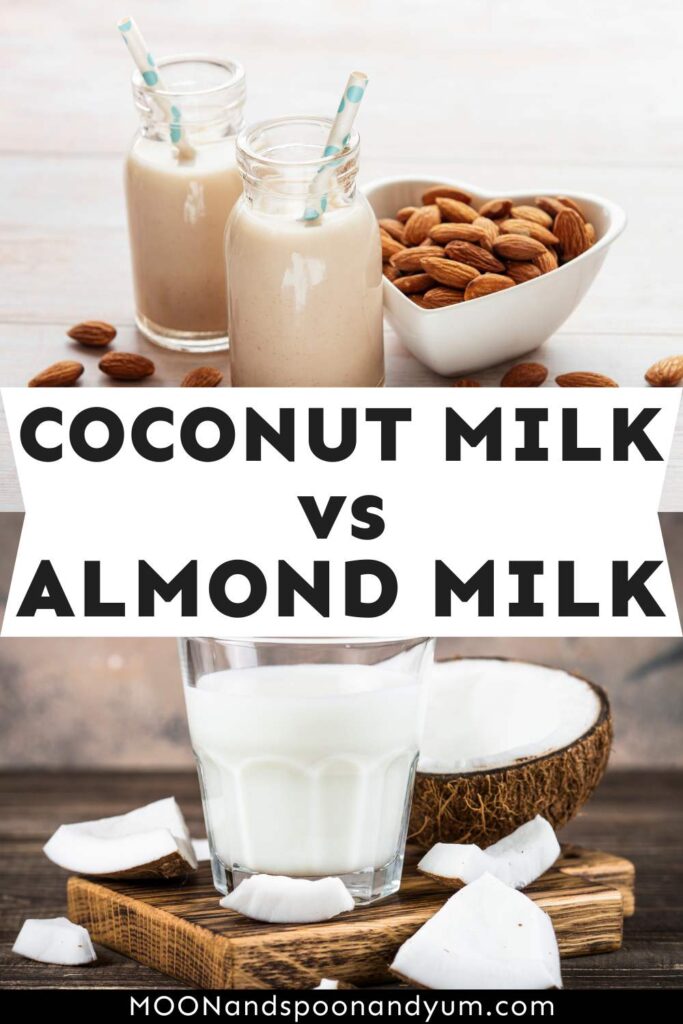Coconut Milk vs Almond Milk
Coconut milk vs almond milk: Which is the perfect dairy-free choice? Uncover the differences and find your ideal plant-based milk in this informative post

Are you trying to decide between almond and coconut milk for your daily latte or smoothie?
A wellness app can help! It offers valuable insights into the nutrition of both ingredients, so you can find the perfect choice to fit your dietary needs. By accessing its in-depth data, you can easily compare the calorie count, fat content, sugar levels, vitamins, and other essential nutritional components associated with each type of milk.
So, let’s dissect the components, nutritional profiles, and benefits of each to help you make an informed decision.
Coconut Milk: A Flavorful Trip to the Tropics
Coconut milk derives its rich texture and unique taste from the white flesh of mature coconuts. It’s the go-to ingredient in many South and Southeast Asian cuisines, adding a creamy texture to curries and desserts.
Nutritional Profile of Coconut Milk
The creamy texture of coconut milk is due to its high-fat content, specifically medium-chain triglycerides (MCTs). Your body quickly absorbs MCTs and can provide a fast energy source.
Health Benefits of Coconut Milk
- Rich in MCTs
MCTs in coconut milk may boost energy and potentially assist in weight management.
- Low Carb
Coconut milk contains minimal carbohydrates, making it a favorite for individuals following a low-carb or keto diet.
- Dairy-Free
Being dairy-free, coconut milk is a perfect alternative for people with lactose intolerance or milk allergies.
Almond Milk: The Nutty Contender
Almond milk has a lighter taste compared to coconut milk. It’s made by blending almonds with water and then straining the mixture, leaving a smooth, creamy liquid behind.
Nutritional Profile of Almond Milk
Almond milk contains fewer calories and less fat than coconut milk, making it a popular choice for those seeking to maintain a lower-calorie diet. It’s also a good source of vitamins E and D.
Health Benefits of Almond Milk
- Low in Calories
Almond milk is significantly lower in calories compared to dairy and other plant-based glasses of milk.
- Bone Health
Fortified almond milk provides vitamin D and calcium, both crucial for bone health.
- Heart Health
Almond milk’s mono- and polyunsaturated fats can contribute to heart health.
Coconut Milk vs. Almond Milk: Making Your Choice
In the coconut milk vs. almond milk dilemma, there is no definitive winner. The choice between these two alternatives ultimately depends on your personal preferences, dietary restrictions, and nutritional goals.
Consider the following factors when making your decision:
Taste
Picture yourself carefully prying open a ripe, freshly fallen coconut. The husk gives way to reveal a treasure within, a reservoir of slightly sweet and enchanting liquid. Upon tasting it, your senses are engulfed by its luxurious creaminess, akin to dairy milk but with an unmistakable hint of tropical lushness. In culinary applications, coconut milk lends a velvety texture and deep, exotic notes to any dish, whether spicy Thai curry or a chilled pina colada.
Almond milk is a soft whisper, a gentle melody on your palate. Its flavor is subdued yet delightful, with a distinct nutty undertone. It’s lighter in texture, a feature that endears it to those who seek a milk substitute that’s lower in calories yet does not compromise on flavor. Almond milk imparts a gentle creaminess and subtle richness, whether poured over a bowl of crunchy granola or blended into a wholesome smoothie.
So, if one were to immerse in the tropical decadence and richness of flavors, creamy coconut milk might be the preferred choice. If the preference leans towards a lighter, more understated nuttiness and lower caloric content, then almond milk could be the favored alternative.
Texture
While both are plant-based milk options, their textural properties are quite different.
The thickness and creaminess of coconut milk make it a go-to choice for those seeking a richer, more indulgent experience. Almond milk, with its lighter consistency, is preferred for those seeking a subtler, lighter mouthfeel.
The two choices often depend on the desired culinary application or personal preference for mouthfeel and richness.
Nutritional needs
If you monitor your calorie intake or try to lose weight, almond milk typically contains fewer calories than coconut milk. An average cup of unsweetened almond milk contains around 30-50 calories, while the same amount of coconut milk (canned, commonly used in cooking) can contain up to 400-450 calories.
Lite coconut milk— a more diluted version— carries fewer calories but is still more calorie-dense than almond milk.
Coconut milk is much more fat than almond milk, most of which is saturated fat. Although this kind of fat can increase the ‘good’ HDL cholesterol levels, it also raises the ‘bad’ LDL cholesterol level, which might increase heart disease risk if consumed in large quantities. On the other hand, almond milk contains much less fat and is primarily unsaturated, which is beneficial for heart health.
Almond milk often contains added calcium and vitamin D and is naturally high in vitamin E, a potent antioxidant. Did you know coconut milk contains essential minerals, such as manganese, copper, phosphorus, magnesium, iron, and potassium? It also includes a significant amount of fiber, making it a nutritious addition to your diet..
Cooking with Coconut and Almond Milk
Both coconut and almond milk can be versatile in the kitchen. Coconut milk is ideal for rich, creamy dishes, while almond milk is excellent in baking or added to coffee and cereal.
The Verdict: Coconut Milk vs. Almond Milk
In conclusion, the coconut milk vs. almond milk debate offers a range of considerations for individuals seeking a dairy milk alternative.
Coconut milk impresses with its rich taste, versatility in culinary applications, and higher calorie and fat content. Almond milk, on the other hand, stands out for its mild flavor, lower calorie count, and potential health benefits.
Ultimately, the decision between coconut milk and almond milk rests on personal preferences, dietary requirements, and environmental concerns.
With the knowledge gained from this comprehensive article, you can confidently choose the nut milk alternative that best suits your needs and embark on a delightful journey of flavorful and nutritious beverages and recipes!

